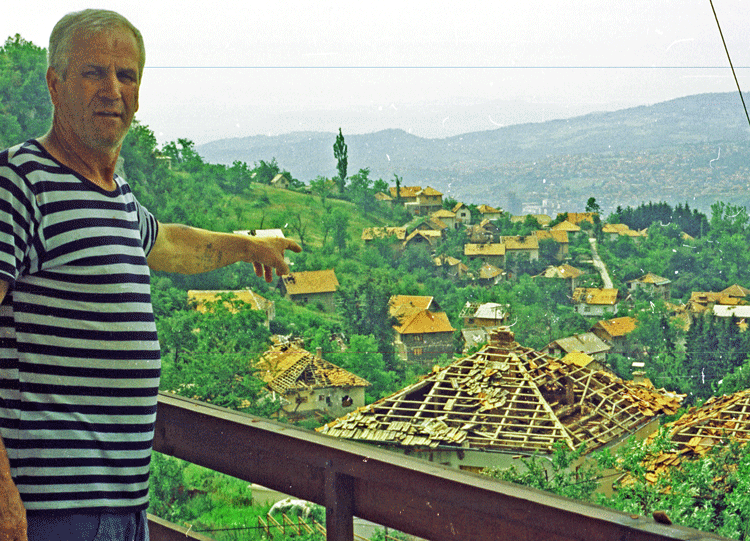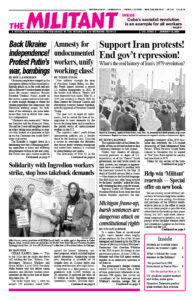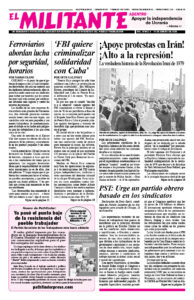As the nearly yearlong invasion of Ukraine by Moscow continues, rising tensions between Serbia, backed by Russian President Vladimir Putin, and Kosovo could lead to new fighting in the Balkans. The attempt by Russian President Vladimir Putin to stamp out Ukraine’s sovereignty has exacerbated the worldwide capitalist economic and social crisis and propelled capitalist powers worldwide to look for new ways to protect and advance their interests.
Following months of rising conflict, Serbs living in northern Kosovo set up barricades in the city of Mitrovica and other areas for three weeks in December. At issue was a decision by the Kosovan government to replace Serbian-issued car license plates with ones issued by Pristina and its threats to fine anyone who didn’t comply. Serb mayors in northern Kosovan municipalities, local judges and hundreds of cops resigned in protest.

The Kosovo government asked the imperialist-led NATO alliance to use its troops to break up the barricades. The government of Serbia then placed its army and police on high alert Dec. 26, claiming Kosovan government forces were preparing to attack Serbs. Tensions eased when the roadblocks were taken down and Pristina reopened its border crossing with Serbia.
Kosovo declared independence from Serbia in 2008. Around 50,000 Serbs live in northern Kosovo. Some refuse to recognize Kosovan independence, as do the Serbian government and Putin. Russian forces conducted several military exercises with Serbian forces in 2021 and Moscow is pushing Belgrade to back its war in Ukraine. Putin uses the U.S.-imperialist bombardment of the former Yugoslavia in 1998-99 and its deployment of NATO forces to Kosovo to cynically justify his invasion of Ukraine.
Commentators in the capitalist press argue that such hostilities are rooted in national, religious, or ethnic strife that have gripped this part of the world for centuries. And, they claim, there’s not much that can be done about this except through intervention by U.S. and other imperialist forces.
Workers and peasants forge unity
But the actual history of the class struggle in the Balkans shows this is not true. Advances in forging unity were made by workers and peasants of every nationality who carried out a socialist revolution in Yugoslavia in the 1940s, overturning the rule of the landlords and capitalists. The gains they made pointed the road forward, despite the fact that a Stalinist leadership stood at the head of the revolution and acted to undermine its conquests. The Stalinist regime in Yugoslavia subsequently fragmented into rival gangs of would-be capitalists in the 1990s.
Yugoslavia was united as a country at the end of World War I under the domination of the Serbian monarchy, which enshrined the second-class status of Kosovo and other republics. The country was invaded and occupied in April 1941 by the German Nazi regime.
Opposition to the occupying forces was organized through the armed Partisans, led by the Yugoslav Communist Party headed by Josip Broz Tito. The Partisans grew rapidly, involving hundreds of thousands of workers and peasants who defeated the German imperialist army and then the native capitalist exploiters.
They established a workers and farmers government. The monarchy was abolished, capitalist industry and banks nationalized and a massive land reform instituted.
In the following years workers and peasants began narrowing some of the extreme regional disparities in industrial development, agricultural productivity and living standards in the country. But over time, the Stalinist misleaders eroded these gains, exacerbating social and regional inequalities, paving the way for the explosion of conflicts in the 1990s.
In 1989-91 Stalinist regimes and ruling parties crumbled across Eastern Europe and the Soviet Union. To maximize their drive to take control of territory and resources, Yugoslavia’s aspiring capitalists fomented nationalist conflicts paid in blood by workers and farmers. By the end of 1992, murderous assaults killed tens of thousands and created some 3 million refugees.
“This is not a war between Serbs and Muslims,” Haris Halilovic, a hotel worker, told a 1992 Militant reporting team in Sarajevo, capital of Bosnia and Herzegovina, in the midst of the war. “You can see it here,” he said, pointing to families of Serbian and Croatian origin, and of the Muslim and Christian faith, crammed into a basement shelter together.
The most aggressive force in these wars was led by Serbian President Slobodan Milosevic. In addition to waging a war to seize territory from Croatia, he was determined to maintain control over Kosovo.
A southern province of Serbia, Kosovo was granted autonomous status in 1974. This was revoked in 1989 by the Milosevic regime, which put in place an emergency rule in retaliation after widespread protests against the denial of national rights of Albanians, who comprise 93% of Kosovo’s population of 1.9 million.
In 1999 the U.S.-led NATO military alliance conducted a massive bombing campaign, destroying factories, refineries and more in Serbia. Hundreds of civilians were killed and thousands injured. Washington’s aim, in what was then the biggest war in Europe since World War II, was to pressure Belgrade into accepting a partition of Kosovo to be enforced with an imperialist occupation army. Some 4,000 NATO troops are still in Kosovo today.
“Since the 1990s, both Democratic and Republican administrations and Congresses have acted to reinforce U.S. imperialism’s post-World War II position as the dominant ‘European’ military power,” wrote Jack Barnes, Socialist Workers Party national secretary in a March 3, 2022, statement for the party’s National Committee. Tensions fostered by capitalist competition, clashes between Washington and Moscow, and Moscow’s war in Ukraine underlie conflicts in the Balkans today.

